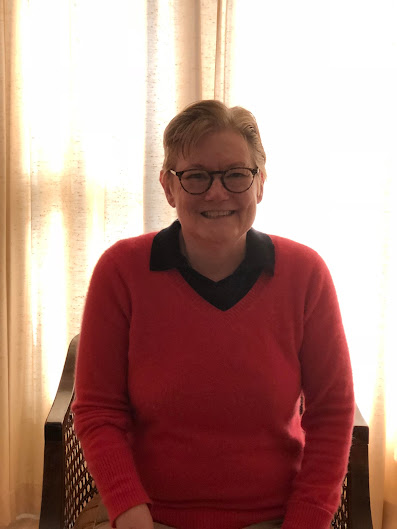Here’s another great reason to attend the Holmes, Doyle,
& Friends conference in Dayton next month: Maureen Francis Mascha, whom I
had the good fortune to meet recently at a meeting of the Torists International
in Chicago. She’s one of the speakers at HD&F.
Maureen held corporate positions in internal audit,
rising to Manager of International Audit for a firm, before leaving that world
to earn a Ph.D. She now teaches Forensic Accounting Investigation, Data
Analysis, and Advanced Auditing at the graduate level for a regional public
institution. In that role, she developed a project analyzing potential causes
for the homicide trends in Chicago for her Data Analysis class. The project
earned a National Award for case excellence from the American Institute of
Certified Public Accountants.
I asked her a few questions about her Sherlockian
journey:
When and
how and when did you first meet Sherlock Holmes?
I first “met” him in
my freshman year of high school. We read “The Adventure of the Speckled Band.”
I was immediately hooked! I became further enraptured watching the reruns of
the Sherlock Holmes series from the late ’30s and ‘40s starring Basil Rathbone
and Nigel Bruce.
How and
when did you become a Sherlockian?
I continued my
reading of the Canon through high school and college, purchasing the full two
volumes of stories and the novels. I saw all contemporary movies regarding
Holmes (such as the “The Seven-Per-Cent Solution”) and any other TV specials or
movies concerning Holmes. Note that this was prior to the Granada Series with
Jeremy Brett and the BBC series, so “the pickings were slim.” When the Granada
series debuted, I became addicted! I have watched each countless times and have
the whole set on VHS AND DVD! I have also indulged in the Robert Downing Jr.
movies and the BBC series. There can never be enough of Holmes!
Fortunately, the
internet became a vehicle for widespread Holmesian distribution—and I followed along. When I worked in “corporate,” I
had little time for extra activities, but after my Ph.D. program I enjoyed more
“me time” and joined several scion societies. And I also was able to peruse the
internet for applicable Holmesian literature, including the volumes on Holmes
written by William S. Baring-Gould.
Your
topic for the Dayton conference is “Women in the Canon.” Has this been a fascination of yours
as you read the Canon over the years?
YES! As a woman, I am
particularly interested in the portrayal of women during the latter part of the
Victorian era, an era not known for considering women as a man’s equal. I was
especially struck by the story of “A Scandal in Bohemia,” where Irene Adler
bests Holmes only to have him become her staunch admirer. Upon further
reflection, as I re-read the Canon, I realized the ACD penned stories with
women as victims, perpetrators, accomplices, and innocent participants. Portraying
women as “perps,” and not always victims, is an angle I would not have expected
from a Victorian writer, especially when the crimes were premeditated and not
“circumstantial.”
The more I read about
women in the Canon and the more research I performed, convinced me that such a
topic was ripe for further investigation, and I was amazed that the topic of
women and how they are portrayed is the subject of world-wide interest,
including being the topic of dissertations! What I find even more compelling is
that the women who penned these tomes often hailed from non-western locales,
including a few in the Muslim world.
Tell us a
little about your auditing and academic career – especially how it has been
affected by Sherlock Holmes.
As you can detect
from my bio, I have had “two lives”: one in corporate America and one in
academia. In my former role, I traveled the globe, auditing sales offices,
divisions, manufacturing facilities, you name it. I began as an auditor and
rose to management. I employed—although I did not fully appreciate it at the
time—some of Holmes’s finest methods, not the least
of which was observation and attention to detail. For example, I detected that
the timecards in one foreign locale had been “prepunched” in and out—even
though the number of timecards did not match the number of employees present and
the time I observed this was midday, not “quitting” time. Needless to say, such
observations led to bigger issues involving fraud.
In
my second life, I stress data analysis as a fraud indicator to my students,
along with observation and logic. I constantly remind my students of the
Holmesian axion: “When you have eliminated the impossible, whatever remains,
however improbable, must be the truth.” This is so often true in the case
studies we examine as part of the coursework.
To what
Sherlockian groups do you belong?
I belong to “The
Torists International,” “The Criterion Bar,” “The Highwood Associates,” and
other on-line groups, ad hoc.
What has
it meant to you to be part of the Sherlockian community?
In a word:
everything. It has afforded me the opportunity to interact and discuss
intelligently a topic I love AND to engage in research (that I also love) which
contributes to people’s understanding and appreciation of Holmes and ACD.
What else
is up your Sherlockian sleeve?
I hope to perform
more research on women in the Canon in addition to analysis concerning the
locales and class structures described in the Canon.
Register for Holmes, Doyle, & Friends at: http://www.agratreasurers.net/holmes--doyle----friends--2022.html

This comment has been removed by a blog administrator.
ReplyDeleteThis comment has been removed by a blog administrator.
ReplyDelete